|
by Deb Portz The benefits of private school choice should not be limited only to those who can afford it. On Sunday, November 18th, I attended a parent meeting in the basement of St. Mary's in downtown Lincoln across the street from our state capitol. About 200 parents were in attendance. St. Mary's pastor, Fr. Dietrich, addressed the crowd of around 200 parents, and explained the financial situation of three of Lincoln's poorest Catholic elementary schools - St. Mary's, Sacred Heart, and Blessed Sacrament. He explained that one or two of these schools would likely close at the end of this school year unless each school could raise $150K+ to cover deficits. That did not include infrastructure needs at each school. These are schools that offer a private, faith-based education to students who live in the highest poverty neighborhoods in Lincoln, and for many, where English is not the primary language spoken in the home (there are 17 languages spoken among students at St. Mary's alone). At St. Mary's, over 90% of the 123 students would qualify for free-and-reduced lunch at LPS. I watched with a broken heart as St. Mary's parents looked for ways they could reverse the direction of these outcomes - one parent offered to sell tamales and work bingo all year, one offered to volunteer skills she was learning in her Marketing class at SCC. I watched math teacher, Frank McEntarffer, offer an aggressive fund-raising plan for parents to engage in during the year, as well as offering half his annual salary ($20,000) to the school. I watched as my friend, and St. Mary's principal, Nina Beck, took questions after the presentation from worried parents who realized they lack options to keep their first choice for educating their children at St. Mary's. I have worked with St. Mary's kids on school choice grassroots activities for the last four years. I have watched them embrace a unique curriculum in math, using Ec3 Academy and UNL Engineering students as mentors to coach middle school math. In those four years, not only have middle schoolers at St. Mary's gone on to Pius and LPS high schools excelling above their peers in math assessment criteria (most have a college-and-career ready ACT score of 23 in the 8th grade), they have eliminated the need for remedial math courses at Pius and won statewide math competitions. They have drastically closed the usual statewide acheivement gaps for minorities in the last 5 years, using less than 1/2 the amount of taxpayer money spent for a student in LPS, and they have done something our public schools in Nebraska have not been able to do in math outcomes in Nebraska in three decades. So much so, LPS approached Ec3's Dan Alberts to have him execute the math curriculum in their schools. Unfortunately, the lack of autonomy and curriculum quality control demanded by LPS made a program that was proven to be highly successful for at-risk students, unable to function within the system using the criteria that made it so successful. If these Catholic schools close, students will either matriculate into LPS at double the cost to taxpayers, or they will be bused to other Lincoln diocese schools. Neither will be the first choice of these parents for the education of their children for all sorts of unique reasons. And while I realize the funding model of Catholic schools is part of this problem, it is also a problem of our state, city and communities in education. I suggested we look at what Omaha has done with similar poor Catholic schools in development, using a model like Cues Omaha (three schools in North Omaha) or Omaha Catholic School Consortium (five schools in South Omaha) for dual language learners. Private school choice legislation across America is not only succeeding at improving education outcomes like closing achievement gaps with low-income minorities, it is saving taxpayer dollars that can be used across many areas of public education. And it gives parents the power to choose the education that fits their child and family. It is the fast-moving progress, innovation and improvement in public education in America that Nebraska is missing out on because the lobbying to protect the power and control of the education monopoly is well-funded in Nebraska. Change will only come as Nebraskans educate themselves more about how school choice benefits everyone, especially our public schools and rural schools. I will continue to work to organize the Nebraska School Choice Week rally each January to raise awareness about the benefits of allowing a parent to choose their child's K-12 education. I will continue to support educators and legislators who are trying so hard to improve the use of taxpayer dollars for public education and how we measure education outcomes with more meaningful and effective approaches. I will continue to testify in legislative committee hearings for school choice and education reform bills, and I will call out the inaccuracies and hypocrisies spoken by state senators, school board members, superintendents, and the teacher's union on how school choice will ruin public education or that we already have equal opportunity in school choice in Nebraska. My coalition colleagues and I will write letters to the local papers, and maybe they will be published, and maybe they won't. But now is time for Nebraskans to support these efforts and make your voices heard. Otherwise, we will continue to lose choices for parents and students that are proven to be successful by having more opportunity to find the best fit for each kid in education. We'll have another post soon to show exactly where their state senator stands on providing students with educational options that meet their needs.
0 Comments
The Blog of Harvard Education Publishing reported that Warren Buffett, who is “ranked among the four or five richest people in the world,” has given about $28 billion to charities, including nonprofits. Sounds great, right? The blog post continues: “Anxiety about large transfers of concentrated private wealth taking place with little public accountability has been an issue in American policy for close to a century. The ‘charitable deduction’ clause in our tax code, which was legislated in 1917, enables donors to hold on to much of their wealth if they donate a minimum amount (roughly 5 percent) to legitimate nonprofit organizations and causes. However, relatively little accounting is required to show exactly how the funds are disbursed, which has been alarming to people regardless of their political orientation.” The Sherwood Foundation IRS 990 form from 2014 lists Warren Buffett as the foundation’s sole contributor. He funded Sherwood’s 2014 operations with 1,160,981 shares of Berkshire Hathaway Inc Class B, which totaled $149,743,329. As we’ve seen from previous posts on this topic, a billionaire is controlling education in Nebraska in a major way. And in this post, we’ll see how a national education figure who regularly blames education issues on the “Billionaire Boys Club” has latched onto Nebraska as a pet project and a source of support. Diane Ravitch’s NPE Organization Ravitch founded the anti-choice Network for Public Education in 2013, and she also runs Network for Public Education Action Inc., which is listed as a 501(c)4 organization on its 2016 IRS 990 form. According to the IRS, 501(c)4 organizations cannot publicly endorse or overtly support or oppose political candidates. In spite of the clear IRS rules governing 501(c)(4) organizations, NPE Action has been endorsing plenty of candidates in a very public way. In March, Diane Ravitch posted the following statement on her blog: In fact, the Network for Public Education Action website posted its November 6 endorsements with the disclaimer, “we cannot endorse in every state and in every race because we are a 501(c)(4), not a Political Action Committee.” We haven't seen any statements from the IRS explaining that 501(c)(4) organizations can endorse candidates in some states and some races but not in others (we're parents, not attorneys, but this seems fairly straightforward). NPE Action also “officially endorses” Andrew Gillum, who is running for Governor of Florida. Gillum has served on the Board of Directors of the Schott Foundation (2013, 2014, 2015), which co-produced “Grading the States: A Report Card on Our Nation’s Commitment to Public Schools” (along with Ravitch’s NPE Action) and paid for activists to attend NPE’s conference in 2015. This report has been highly touted by the Nebraska Department of Education and by Sherwood-funded nonprofits that are desperately trying to hang on to top-down control of Nebraska’s K-12 education. According to IRS reports, the Schott Foundation for Public Education has working operating funds of many millions of dollars every year while Ravitch’s Network for Public Education operates on far less. The “Grading the States” report ranked Nebraska #1 in the country for “commitment to democracy,” which is beyond ironic given the study’s methodology. In other words, the authors of this study held up a small state controlled by a billionaire as a bastion of democracy while it awarded last place to Georgia, Florida, and Arizona, where parents have many different educational opportunities to choose from for their children’s educations. The Schott Foundation for Public Education's board of directors include Antonia Darder, who founded “a member-supported radical teachers organization committed to an educational vision of schooling intimately linked to social justice, human rights, and economic democracy” and whose mentor, the Brazilian Marxist Paulo Freire “profoundly shaped the direction of her early work” (unbelievably, these quotations come directly from the Schott Foundation for Public Education’s 2015 IRS 990 form); Alvin Louis Starks, who “aspires to expand and stretch the untapped possibilities of social justice advocacy” and worked at Open Society Institute, founded and funded by billionaire George Soros; Deborah LaBelle, a Senior Soros Justice Fellow; and Baishali Rinku, also known as Rinku Sen, who is an expert on “intersectionality organizing.” The authors of the “Grading the States” report are Tanya Clay House, a strategist for the Schott Foundation; Carol Burris, Executive Director of NPE; and Darcie Cimarusti, Communications Director of NPE. They're activists, not academics, and yet, many in Nebraska treated this report as if it were peer-reviewed research about student outcomes. The report doesn’t grade the states on any of the metrics that matter to parents: proficiency in core subjects, college readiness, ACT scores, or success beyond K-12. Instead, the authors of the study rank the states on degree of government control over education. And, of course, Nebraska wins! How could it be otherwise? Where else in America are so few people flooded with so much money aimed at sustaining the bureaucratic status quo? Which other state has one of the “four or five world’s richest people” eager to implement his vision for society? And what is that vision? In 2014, Gene Glass from the National Education Policy Center at University of Colorado wrote the following in a blog post: “What if I said to you that the solution to the problems in our education system would be to ‘make private schools illegal and assign every child to a [state] school by random lottery’? That’s the view not of Karl Marx or the Chinese Communist Party but of the billionaire US investor and philanthropist Warren Buffett.” Is it any surprise that Sherwood Foundation nonprofits are working with the Marxists at the Schott Foundation to try to affirm the stranglehold a billionaire has on Nebraska’s education system? Nebraska is an easy target, a petri dish for those who would love to try out their unAmerican ideas on American students. And our Nebraska school administrators and elected officials are playing right into their hands. Diane Ravitch and Susie Buffett On November 18, 2015, Diane Ravitch visited Omaha at a gathering billed as Metropolitan Omaha Educational Consortium event. Susie Buffett paid for Ravitch’s trip, and during the visit, Ravitch appeared in a NElovesPS film. In 2014, Sherwood Foundation had given $698,353 to an Omaha company called Just Jump Films, Inc, which appears to be NElovesPS, according to Brittany Mascio’s LinkedIn profile. In 2015, Just Jump received over $1,000,000 from Sherwood, and in 2016, Sherwood spent over $2,000,000 on Just Jump. Diane Ravitch often talks about billionaire influence on the school choice movement, but she doesn’t talk about her own billionaire connections. She works hand-in-hand with both the Schott Foundation for Public Education and the Sherwood Foundation to prevent low-income students from having the education options that their wealthier peers have. The crowd Ravitch works in also enjoys some pretty nice benefits that are unthinkable for parents who can’t afford options outside of the traditional public schools. Did you know that her colleagues at the Schott Foundation for Public Education get reimbursed by the nonprofit for their $75/month health club memberships (according to the 2015 Schott Foundation 990--Part III, Supplemental Information)? Stand For Schools as Local Partner for NPE Stand for Schools, which is funded by the Sherwood Foundation, is listed as a local partner for Diane Ravitch’s NPE. Additionally, Stand for Schools president Ann Hunter-Pirtle served as a speaker at the NPE convention. This is an important connection between Diane Ravitch and the Sherwood Foundation. Ravitch can hold Nebraska up as a bastion of no choice, and Stand for Schools and other Sherwood nonprofits can get national attention from Diane Ravitch. This national attention, including documents like the “Grading the States” report, help Nebraska educators and even some parents to accept the increased government control (think about the forays into early childhood by the Buffett Institute). Everyone enjoys accolades and recognition, especially when it comes from national sources. Ravitch and the Billionaire Girls Club Diane Ravitch relentlessly accuses Bill and Melinda Gates and the Walton Family of undermining public education because they donate to all kinds of education options rather than just to traditional public schools. Perhaps these other philanthropists recognize the fact that kids are all different, and what works for one child won’t necessarily work for all of them. In the same breath, Ravitch is working with billionaires to make sure children are treated as a collective whole instead of as individuals with unique challenges, strengths, and dreams. Based on the latest batch of Nebraska ACT scores, the time to diversify education options in the state is long past due. Will Nebraska legislators prioritize children over billionaires this upcoming session? Time will tell. In the meantime, parents and concerned citizens should be careful about the people they elect to the unicameral. Are any of the candidates in your district funded by the Sherwood Foundation? Do any of them work for Sherwood-funded nonprofits? It’s also important to hold school board members and school administrators accountable. Watch to see who slavishly retweets propaganda produced by NElovesPS, NPE, NCSA, Open Sky, Nebraska Appleseed, Stand for Schools, and other arms of the billionaire octopus. We parents and citizens may not have the money to compete with billionaires, but we can vote for freedom and choice and we can hold our lawmakers accountable if they’re loyal to billionaires at our expense. Catch up on the Series:
Part One: NCSA and Affiliates Part Two: Elected Officials Part Three: Activism in the ESUs |
|
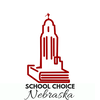
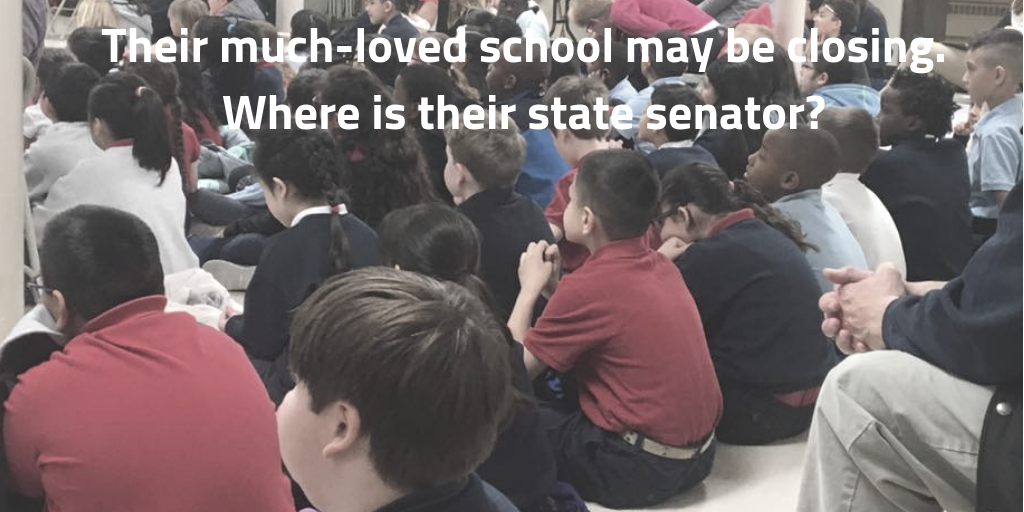
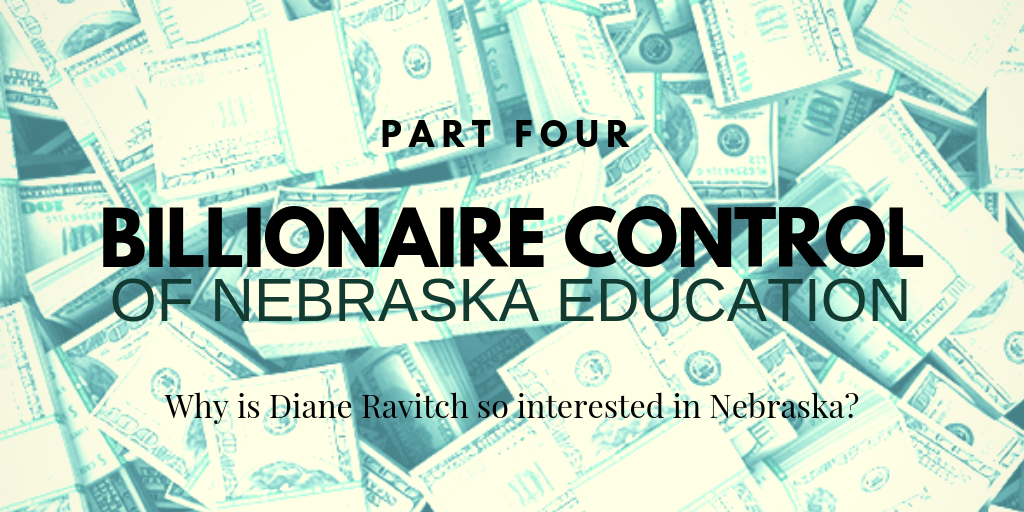
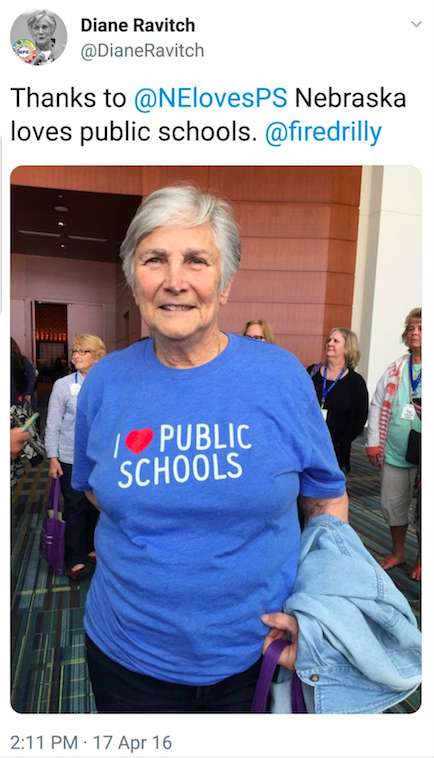
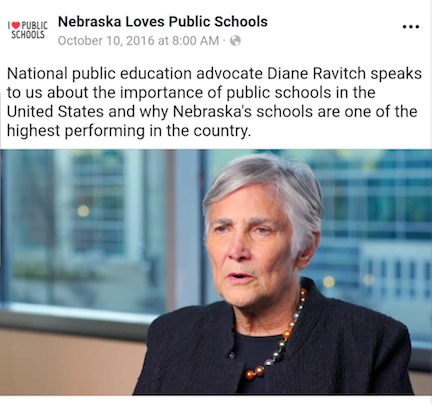
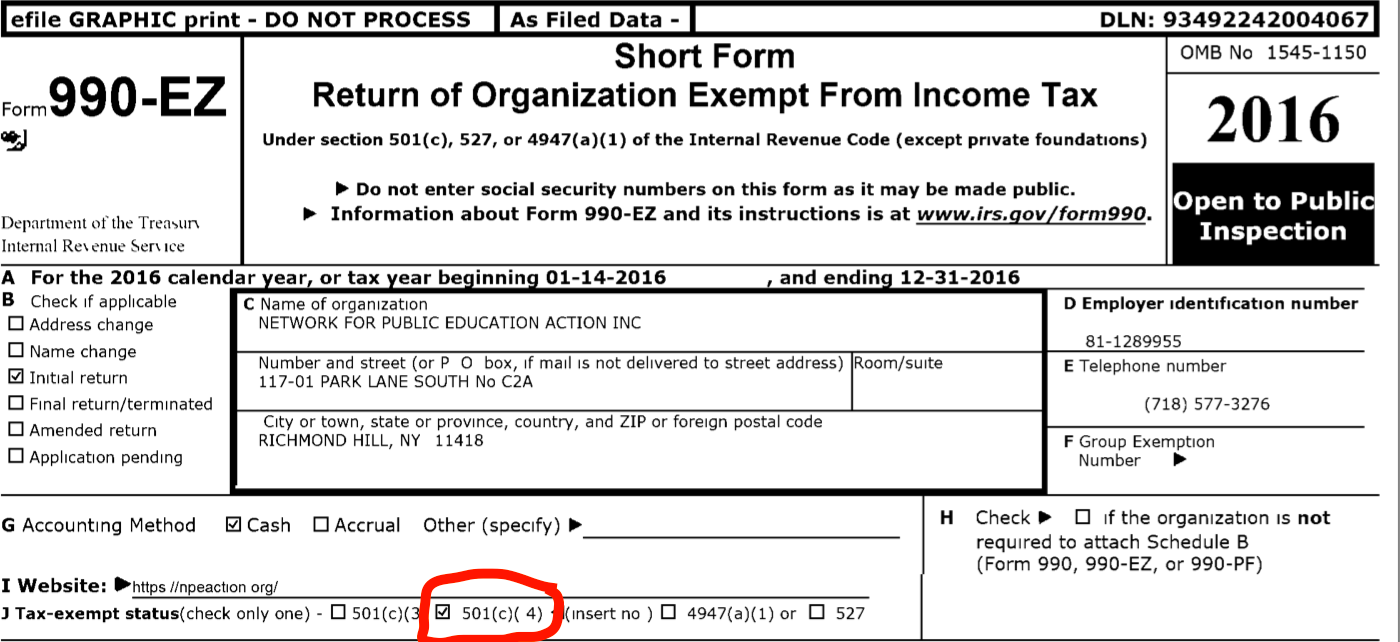
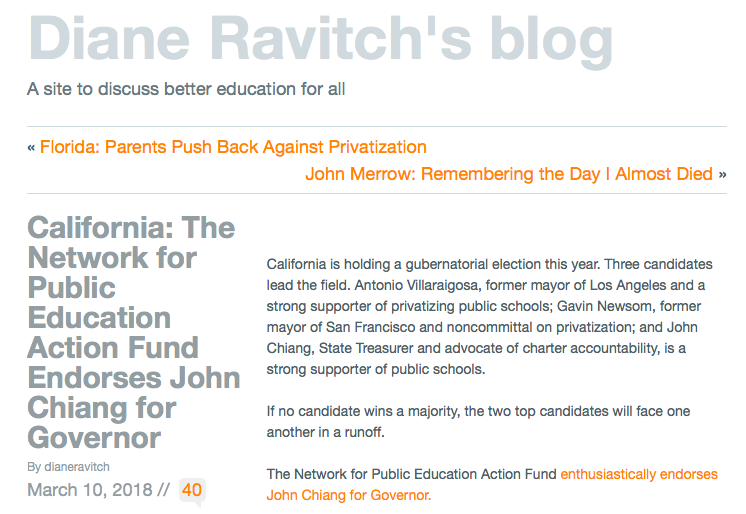

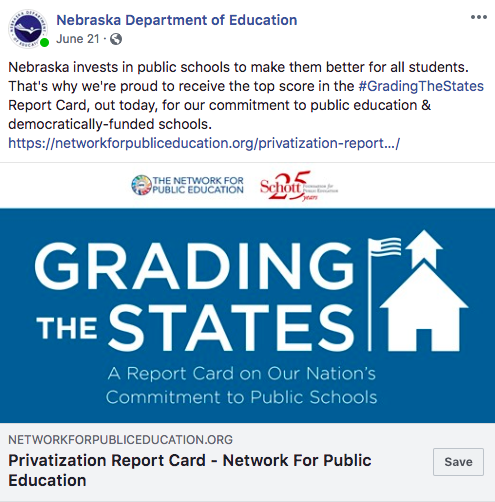
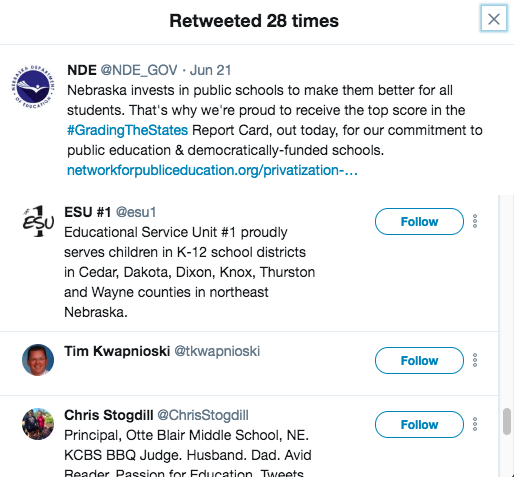
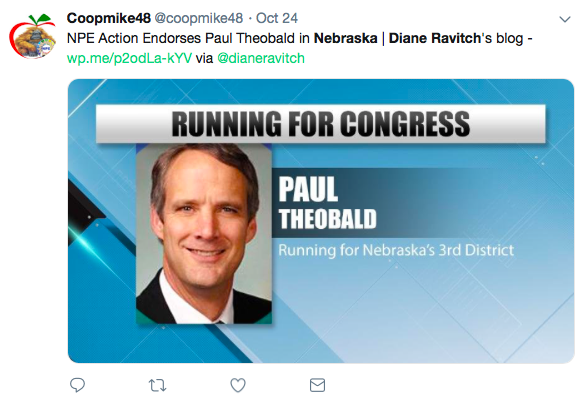
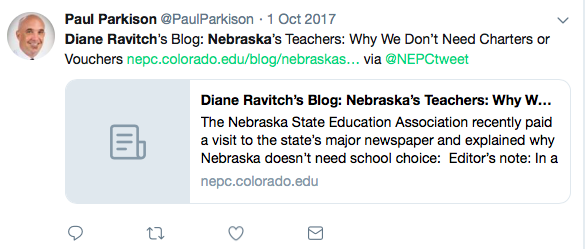
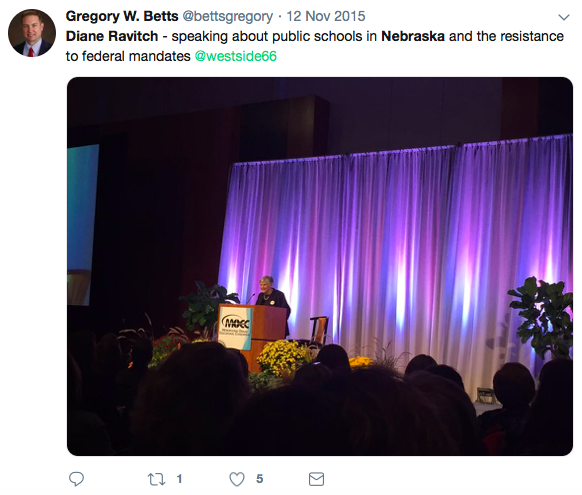
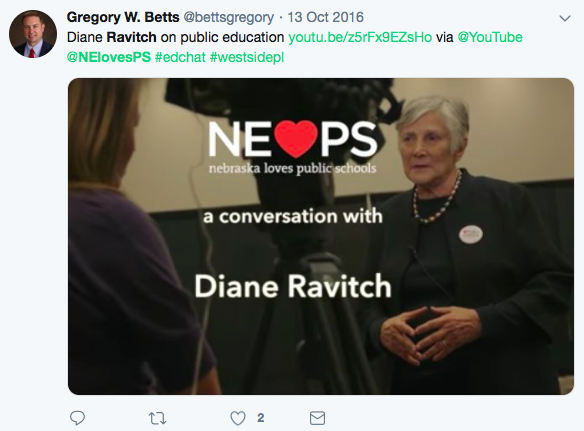
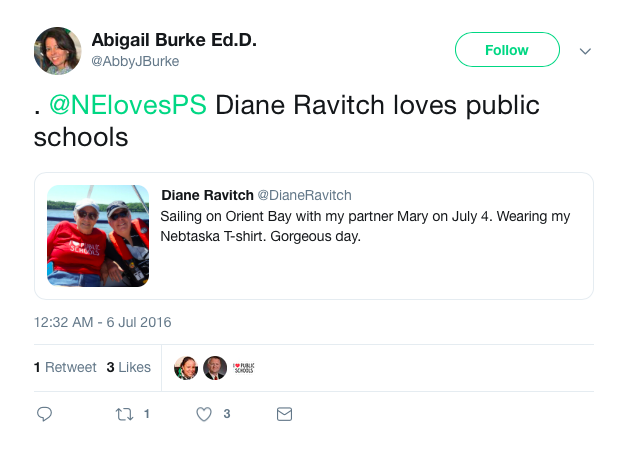


 RSS Feed
RSS Feed